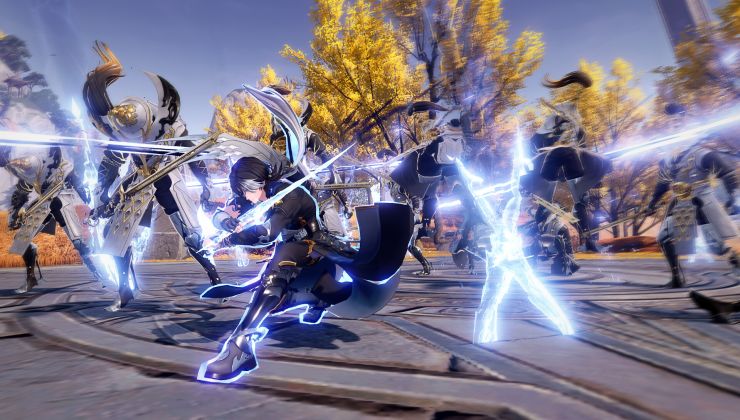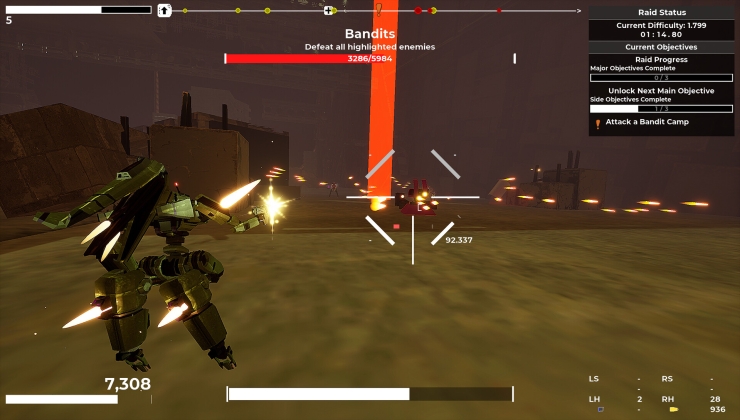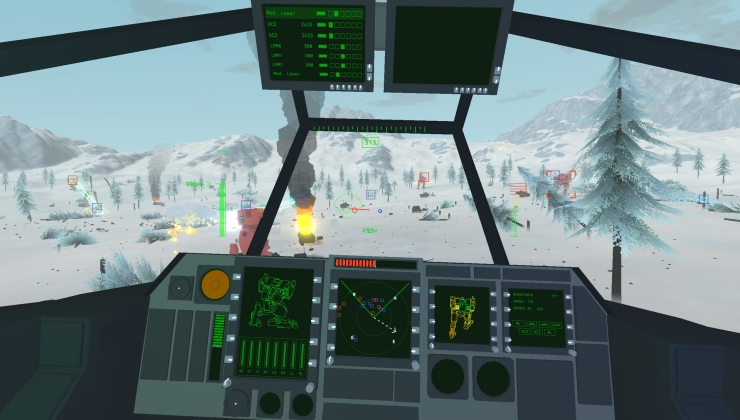Today Valve made quite a big announcement about the future of VR, including an entire platform being dropped.
In a really short post on the official SteamVR page on Steam, Valve said "SteamVR has ended OSX support so our team can focus on Windows and Linux." with there now being a legacy branch of SteamVR for macOS. This is not long after the release of SteamVR 1.11, the "Spring Cleaning" update on April 20.
Seems odd to see such a big shift announced so abruptly, with no other reasoning. Worth noting though, Valve's own hardware with the Valve Index was never stated as supported on macOS, only "Windows 10, SteamOS, Linux". It's always sad when a platform gets support for anything dropped, which we as Linux gamers know too well, but in this case it's actually a boost for Linux for once.
With Valve now having more resources for Linux (and Windows), we might now see an increase in attention on SteamVR for Linux which has been quite rough. It's also great to see other areas of Valve call out Linux specifically as being a focus for them. We also have the Linux version of Half-Life: Alyx with Vulkan support coming hopefully sometime soon.
Since Linux is open source, as are the drivers for AMD and Intel, it makes sense to continue Linux support. Valve can (and already do) experiment a lot with Linux and pay contractors to work on various things. At times, they can do things quicker on Linux than they can on Windows (and vice versa - some bits don't work on Linux).
As of the March data from the monthly opt-in Steam Survey, 1.29% of people surveyed had a VR kit. The most popular being Oculus Rift S with the HTC Vive close behind. The Valve index already captured quite a big chunk though too at over 10%.
What do you think to this news?
In related news, Collabora have been progressing well on their fully open source OpenXR runtime Monado.
In case of VR MacOS... MacOS is a niche, VR is a niche and having a MacOS VR capable hardware is probably the nichest of the niches.
It's starting to be a lot of probability layers, against MacOS. Add to this the fact that the Mac ecosystem is a walled garden and does not support Vulkan natively... Waste of time?
Last edited by Mohandevir on 1 May 2020 at 4:30 pm UTC
Last edited by Shmerl on 1 May 2020 at 4:47 pm UTC
Quoting: CreakI am mostly worried about the reason why they dropped VR for an entire platform that has more users than Linux's. Obviously, financially, it makes little sense.OK :D
We can speculate as much as we want.
Valve have been the primary driver behind Vulkan, from the glNext days. Apple aren't the least bit interested in Vulkan, using Metal exclusively. When Ubuntu wanted to drop maintenance of 32-bit libraries without a robust containerisation system already in place, Valve opted to only support those distros that could keep everything working. In the same situation, Apple just said "too bad, so sad." Linux doesn't bring Valve a lot of money, but makes Valve's job a lot easier. Apple doesn't bring Valve a lot of money, and makes Valve's job a lot harder. Valve wanted a backup plan should Windows ever be untenable; Apple have made it clear that macOS isn't going to be it. If Valve are going to create a VR future, and they seem to be interested in that, it's too much of an uphill struggle to involve macOS in that.
Quoting: ageresWhat is SteamVR, then?Quoting: cusa123What makes me angry about valve is that it is not available worldwide. I want to buy one in my country but it doesn't arrive or there isn't one.You must be confusing SteamVR with Valve Index.
I want to go to linux!
Furthermore, Apple is reportingly planning to slowly transition their Macs to the ARMv8 platform that their iPhones and iPads use. When that happens, it's fair to assume that Steam will no longer work at all or it will have to run with with an x86 translation layer, reducing performance due to overhead.
If you like PC gaming, stay away from Apple Macs like the plague, unless you plan to install Windows or Linux on your x86 Mac. IMO, It's better not to give Apple your money in the first place.
Last edited by Xaero_Vincent on 1 May 2020 at 6:17 pm UTC
It doesn't take a genius to see the direction a company is headed to predict the future. Years back their refusal to update to current OpenGL, and then their hostility toward holding back Steam from a update on the App Store and then refusal to allow Vulkan on OSX -- and now for "reasons" Valve is dropping their experimental OSX support -- I guarantee it's because Apple made it difficult and lent no hands -- I mean why would they when they both make money on a % of App Sales -- they are direct competition in that model.
I'm just so glad I swore off their products 10 years ago after the absolute shit-show it was to download and upload music to and from a iPod
Download Music From Your iPod ???
!<!>!<!< bUUt ThAt WoULd bE STeALiNg !.!.!>!>!>!
F. Apple
F. Facebook
F. Google
Back in the day it just used to be Microsoft shafting users -- now all these companies have joined the club. May they Rot in pieces, we don't need them or want the trash they're pushing.
1) most of them simply do not have the GPU power to do it. Unless you get an expensive eGPU.
2) what software worked in VR? They have to wrap VK through Metal
3) Who still games on a mac? I'd think most mac users who game do it on either a Win/Lin computer, or on game consoles.
4) Most hardware that used to be game worthy have stopped getting new OS updates made for them (specifically the nvidia based ones).
I'm just wondering what sort of hardware was even required that Apple provides that could handle VR?
Quoting: PinguinoSteamVR is the software that works with all the VR headsets vs Valve Index is the Hardware head mounted display.Quoting: ageresWhat is SteamVR, then?Quoting: cusa123What makes me angry about valve is that it is not available worldwide. I want to buy one in my country but it doesn't arrive or there isn't one.You must be confusing SteamVR with Valve Index.
I want to go to linux!
Quoting: CreakI am mostly worried about the reason why they dropped VR for an entire platform that has more users than Linux's. Obviously, financially, it makes little sense.While it seems this way, when you think about users of a graphics API it makes more sense. What apple did with metal is cut down the likelihood someone would develop for it. This is due to the fact the metal API is only for 3% of the market. Vulcan due to being on windows and Linux has a much larger target base and is a better sell.
The success of VR depends on the graphics API, and apple kind of shot themselves in the foot in terms of adoption
Last edited by miawgogo on 2 May 2020 at 10:34 am UTC
Quoting: EhvisMost power right now is probably with the Hackintosh users. Which still use the official nvidia drivers.Which Valve can't directly say they can support it, as they're definitely on the gray side of legal.
That's like a couple macbooks that were given to me, the only way to go beyond El Capitan on them is to use a hacked installer for the newer releases, to include drivers that were yanked out of the macOS releases. There literally is no other reason they can't still support systems from 2008/9, beyond they don't want to, and because nvidia and Apple can't get along.
Of course I don't know all the details of that, but from an Apple fan's perspective, it's because nvidia's drivers are crappy, and Apple had to write their own?
I think nvidia's drivers are actually pretty damned good, it's pretty much the only reason I chose them over AMD.
I'm curious if this will shift the focus of developers, or if VR on macOS wasn't in their interest at all. Though I have still have a MacBook Pro from 2011, I never tried VR as I think its hardware is way too weak. There were already a handful of native VR games on Linux since the beginning of VR, but I was not aware of any native macOS VR titles.
In the Steam Hardware survey macOS has a higher share than Linux, and it was (almost) never an issue for devs to support macOS... so might this be the start of the end for games on macOS? Maybe mac gamers are switching to Linux, as Windows users apparently didn't with the end of the support of Windows 7.
Though I'm a big fan of having the freedom of choice, and dropping support for a platform is limiting choice, I have to admit, that I'm happy it wasn't the drop of Linux support.
Quoting: CorbenOof, RIP SteamVR for macOS.Oh Windows 7 will have diehard people still using it and refusing to upgrade for at least another 5 years. Pretty sure there are still people using XP, and I've even seen a continual service pack being created / added to for 98SE...
I'm curious if this will shift the focus of developers, or if VR on macOS wasn't in their interest at all. Though I have still have a MacBook Pro from 2011, I never tried VR as I think its hardware is way too weak. There were already a handful of native VR games on Linux since the beginning of VR, but I was not aware of any native macOS VR titles.
In the Steam Hardware survey macOS has a higher share than Linux, and it was (almost) never an issue for devs to support macOS... so might this be the start of the end for games on macOS? Maybe mac gamers are switching to Linux, as Windows users apparently didn't with the end of the support of Windows 7.
Though I'm a big fan of having the freedom of choice, and dropping support for a platform is limiting choice, I have to admit, that I'm happy it wasn't the drop of Linux support.
I wonder how many of the percentage of mac vs linux users on Steam are due to simpler games, like say the hidden object type games, that aren't very hardware intensive. Your average macbook would be able to handle those fine.
When was the last macbook pro you could even get a dedicated GPU on? Not many people are going to be playing games on the trash can or the new mac pro that has a crazy cost.
Here's the real question that should be asked though. It's not macOS having higher share than Linux. It's 'How many macOS users has a VR system connected to it vs how many people with Linux machines have a VR system connected to it?' I bet you it's probably 0% compared to not 0%. :)
Quoting: slaapliedjeOh Windows 7 will have diehard people still using it and refusing to upgrade for at least another 5 years. Pretty sure there are still people using XP, and I've even seen a continual service pack being created / added to for 98SE...I'm still using the "unofficial" Win XP for synchronize/back-up my dad's 11 years old Sony Ericsson phones. :P
Quoting: CreakI am mostly worried about the reason why they dropped VR for an entire platform that has more users than Linux's. Obviously, financially, it makes little sense.The first thing that comes to my mind is, sure, MacOS may have more users than Linux in absolute terms, but what if you just compare the number of VR users? From the points others have raised in the comments it's not too far-fetched to think that there are more Linux VR users than Mac ones. We might not have access to those numbers, but it's a safe bet that Valve does. From that perspective (plus all the difficulties people have raised with developing for MacOS), this probably is the financially sensible solution.
Though it's also Valve, who do their own thing. :) Betting on Linux was hardly financially sensible*! They could just be tired of dealing with MacOS, or have something else in mind.
*at the time, obviously I and they both think it's a good long-term investment but I'm hardly sure we've collectively spent enough money on Steam to pay off the work done on Linux support yet.










 1 May 2020
1 May 2020




 How to setup OpenMW for modern Morrowind on Linux / SteamOS and Steam Deck
How to setup OpenMW for modern Morrowind on Linux / SteamOS and Steam Deck How to install Hollow Knight: Silksong mods on Linux, SteamOS and Steam Deck
How to install Hollow Knight: Silksong mods on Linux, SteamOS and Steam Deck